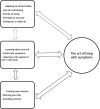The Art of Living With Symptoms: A Qualitative Study Among Patients With Primary Brain Tumors Receiving Proton Beam Therapy
- PMID: 30688666
- PMCID: PMC7043731
- DOI: 10.1097/NCC.0000000000000692
The Art of Living With Symptoms: A Qualitative Study Among Patients With Primary Brain Tumors Receiving Proton Beam Therapy
Abstract
Background: Symptom management in conjunction with proton beam therapy (PBT) from patient's perspective has not been explored. Such knowledge is essential to optimize the care in this relatively new treatment modality.
Objective: The aim of this study was to explore the process of symptom management in patients with brain tumor receiving PBT.
Methods: Participants were 22 patients with primary brain tumor who received PBT, recruited in collaboration with a national center for proton therapy and 2 oncology clinics at 2 university hospitals in Sweden. Interviews using open-ended questions were conducted before, during, and/or after treatment. Verbatim interview transcripts were analyzed using classic Grounded Theory.
Results: "The art of living with symptoms" emerged as the core concept. This encompassed 3 interconnected symptom management concepts: "Adapting to limited ability," "Learning about oneself," and "Creating new routines." These concepts were summarized in a substantive theoretical model of symptom management. Despite the struggle to manage symptoms, participants lived a satisfactory life.
Conclusions: Symptom management in conjunction with PBT comprises a process of action, thoughts, and emotions. The concepts that emerged indicated patients' symptom management strategies were based on their own resources.
Implications for practice: It is important that PBT facilities develop an approach that facilitates the symptom management process based on patients' experiences of symptoms, as well as their actions and available resources.
Conflict of interest statement
The authors have no conflicts of interest to disclose.
Figures
Similar articles
-
To become part of the team-patient experiences of participating in decision-making for a new treatment (proton beam therapy).Support Care Cancer. 2024 Jun 18;32(7):442. doi: 10.1007/s00520-024-08631-y. Support Care Cancer. 2024. PMID: 38890189 Free PMC article.
-
Patients' perspective in the context of proton beam therapy: summary of a Nordic workshop.Acta Oncol. 2020 Oct;59(10):1139-1144. doi: 10.1080/0284186X.2020.1762927. Epub 2020 Jun 13. Acta Oncol. 2020. PMID: 32536238
-
Symptom Clusters in Patients With Brain Tumors Undergoing Proton Beam Therapy.Oncol Nurs Forum. 2019 May 1;46(3):349-363. doi: 10.1188/19.ONF.349-363. Oncol Nurs Forum. 2019. PMID: 31007260
-
Proton Beam Therapy for Pediatric Brain Tumor.Neurol Med Chir (Tokyo). 2017 Jul 15;57(7):343-355. doi: 10.2176/nmc.ra.2017-0003. Epub 2017 Jun 9. Neurol Med Chir (Tokyo). 2017. PMID: 28603224 Free PMC article. Review.
-
Hadrontherapy for cancer. An overview of HTA reports and ongoing studies.Recenti Prog Med. 2019 Dec;110(12):566-586. doi: 10.1701/3278.32516. Recenti Prog Med. 2019. PMID: 31909760 Review. English.
Cited by
-
"Such a different type of tiredness": people with brain tumour, their caregivers', and healthcare professionals' qualitative perceptions of cancer-related fatigue.J Cancer Surviv. 2024 Oct 15. doi: 10.1007/s11764-024-01691-3. Online ahead of print. J Cancer Surviv. 2024. PMID: 39405030
-
Evaluating patient reported outcomes and experiences in a novel proton beam clinic - challenges, activities, and outcomes of the ProtonCare project.BMC Cancer. 2023 Feb 9;23(1):132. doi: 10.1186/s12885-023-10586-y. BMC Cancer. 2023. PMID: 36759789 Free PMC article.
-
To become part of the team-patient experiences of participating in decision-making for a new treatment (proton beam therapy).Support Care Cancer. 2024 Jun 18;32(7):442. doi: 10.1007/s00520-024-08631-y. Support Care Cancer. 2024. PMID: 38890189 Free PMC article.
-
Managing an altered social context-Patients experiences of staying away from home while undergoing proton beam therapy.Nurs Open. 2020 Apr 14;7(4):1157-1163. doi: 10.1002/nop2.490. eCollection 2020 Jul. Nurs Open. 2020. PMID: 32587735 Free PMC article.
-
The Heterogeneity of Symptom Burden and Fear of Progression Among Kidney Transplant Recipients: A Latent Class Analysis.Psychol Res Behav Manag. 2024 Mar 18;17:1205-1219. doi: 10.2147/PRBM.S454787. eCollection 2024. Psychol Res Behav Manag. 2024. PMID: 38524288 Free PMC article.
References
-
- The National Board of Health and Welfare. 2017. http://www.socialstyrelsen.se/statistics/statisticaldatabase/cancer. Accessed September 30, 2018.
-
- Wen PY, Kesari S. Malignant gliomas in adults. N Engl J Med. 2008;359(5):492–507. - PubMed
-
- Ahlberg K, Ekman T, Gaston-Johansson F, Mock V. Assessment and management of cancer-related fatigue in adults. Lancet (London, England). 2003;362(9384):640–650. - PubMed
-
- Scoccianti S, Detti B, Cipressi S, Iannalfi A, Franzese C, Biti G. Changes in neurocognitive functioning and quality of life in adult patients with brain tumors treated with radiotherapy. J Neurooncol. 2012;108(2):291–308. - PubMed
-
- Yuh GE, Loredo LN, Yonemoto LT, et al. Reducing toxicity from craniospinal irradiation: using proton beams to treat medulloblastoma in young children. Cancer J. 2004;10(6):386–390. - PubMed
Publication types
MeSH terms
LinkOut - more resources
Full Text Sources
Medical


